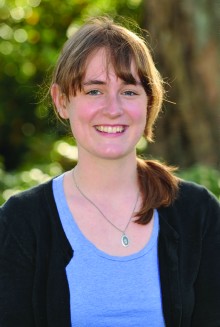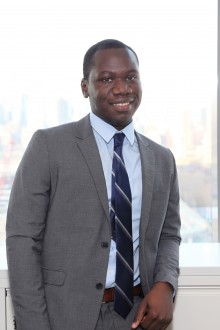Watson wins
From Spain to Japan, Thailand to Peru, two Wheaton seniors will spend their first year as graduates traveling around the world studying the preservation of sacred objects and the ways in which grassroots efforts help to transform public health in underdeveloped countries.
Lindsay Koso ’15 and Nana Asare ’15 received word today (March 13) that they have each won a Thomas J. Watson Fellowship, a $28,000 award that enables graduating college seniors to pursue a self-designed global research project. The pair join more than a dozen Wheaton students who have received the prestigious award in the past 30 years.
Seeking out the sacred
Koso, of Lexington, Mass., a double major in art history and Latin, will be traveling to Spain, Japan, Turkey and India during her Watson year.
“My expedition will be full of conversations with worshipers, conservators and lay people alike. With their help, I will better understand how sacred objects influence the way people worship. I will discover how sacred objects are accessible to everyday people and how objects affect people’s spiritual journey,” Koso wrote in her Watson proposal.

In Spain, she will investigate legendary sacred objects, such as the Holy Grail; in Japan, she will meet with conservators at the Kyoto National Museum and attend an annual festival featuring enormous, shrine-shaped floats. She will make several stops in Istanbul, Turkey, including a return to the Hagia Sophia, a building that first captured her awe on a family trip in 2007. In India, she will visit the National Museum in New Dehli and the Global Vipassana Pagoda, which houses the Buddha’s bone relics.
Koso credits her family for instilling in her an awe of material culture, an interest in studying art and art making and a love of “beautiful things.” Since 2012, she has worked with the Wheaton College Permanent Collection, cleaning and repairing objects “ranging from Ancient Roman glass vessels to 20th century Akan carving tools,” according to her application. She is interested in a career in art conservation.
“At Wheaton, I have made the most of opportunities to nurture my wanderlust and sought out programs across the world to pursue my passion for conservation, applying for numerous grants to support these travels,” Koso wrote. “I have conserved ancient mosaics and pottery in Italy and Macedonia, studied traditional painting with Bhutanese masters and viewed hundreds of objects in museum after museum.”
A Watson recipient herself, Lisa Gavigan ‘83 helps Wheaton students prepare their Watson applications in her role as director of career services in the college’s Filene Center. In her nomination of Koso, Gavigan wrote that the senior “embodies many of the Watson criteria, but mostly that of showing self-initiative and self-direction.”
“She knows the Watson she wants to design, understands what she has to accomplish and gets the work done,” Gavigan said. “Lindsay’s is truly the three-dimensional Watson: the project is Lindsay, Lindsay the project, and the completion of this year will result in a wholly transformed individual.”
The needs of the many
Asare’s Watson application was completed, Gavigan said, after he met with an advisor to discuss graduate school options and realized the fellowship fit perfectly with his goals and interests.
“Nana Asare longs to be in the company of those who help others. The Watson is the perfect vehicle for him to connect with likeminded people while discovering what he has to offer. He is self-sufficient and resourceful. He has had to be. The Watson, I believe, will challenge him to better trust in his intuition,” Gavigan wrote in her nomination of him.
An American raised in the village of Obomeng in Ghana, Asare is interested in exploring how communities around the world exhibit the Ubuntu philosophy of “I am, because we are,” addressing the public health needs of people as a whole instead of as individuals. Now living in Brooklyn, the senior anthropology major will travel to Peru, Rwanda, Ethiopia, Nepal and Thailand during his Watson year.
“Like in my village in Ghana, people worldwide lack access to education, food, water, clinics and other essential elements for healthy living. I am confident that the most successful grassroots public health initiatives draw on the experiences and cultural ties motivated individuals share with communities,” Asare wrote in his Watson application. “[…] Through a global exploration of public health strategies and the support of the Watson Foundation, I hope to understand local leaders that are shaping the world’s health futures.”
Asare will live and work in communities around the world, volunteering with various public health organizations. In Peru, he will work with groups supporting indigenous communities in the Andes mountains, an area with the highest rate of waterborne diseases and maternal deaths in Latin America. In Rwanda, he plans to meet with individuals who serve as intermediaries for quality health care-deprived communities, finding out what motivates these people to put themselves and their families at risk of political repercussions in order to help others. In northern Thailand, where the doctor-to-patient ratio is about one to 13,500, Asare will volunteer with health and development workers in the Warm Heart Worldwide foundation.
“A year abroad as a Watson Fellow will allow me to understand different iterations of the interconnectedness between the Ubuntu philosophy and grassroots health initiatives,” Asare said. “My journey will be more than connecting with individuals who are making a difference. I will learn the values, strategies and intuitions that inspire people to help those facing precarious health conditions. As an individual interested in social justice, this experience is vital to my life objective of giving back to my own community.”
Asare’s grandparents and community in Ghana helped spark his passion for public service and social advocacy, and he said in his Watson application that he hopes his year of traveling will test his dedication to that passion, as well as his resilience.
“A year as a Watson Fellow will allow me to continue an engaged learning experience inspired by my childhood. It will grant me the opportunity to participate in a grassroots health initiative, acquire practical knowledge from individuals making a difference and also learning about communal reciprocity through the lens of individuals,” he wrote. “Through my journey, I will amass intangible experiences that will complement my repertoire of strategies in implementing public health.”

